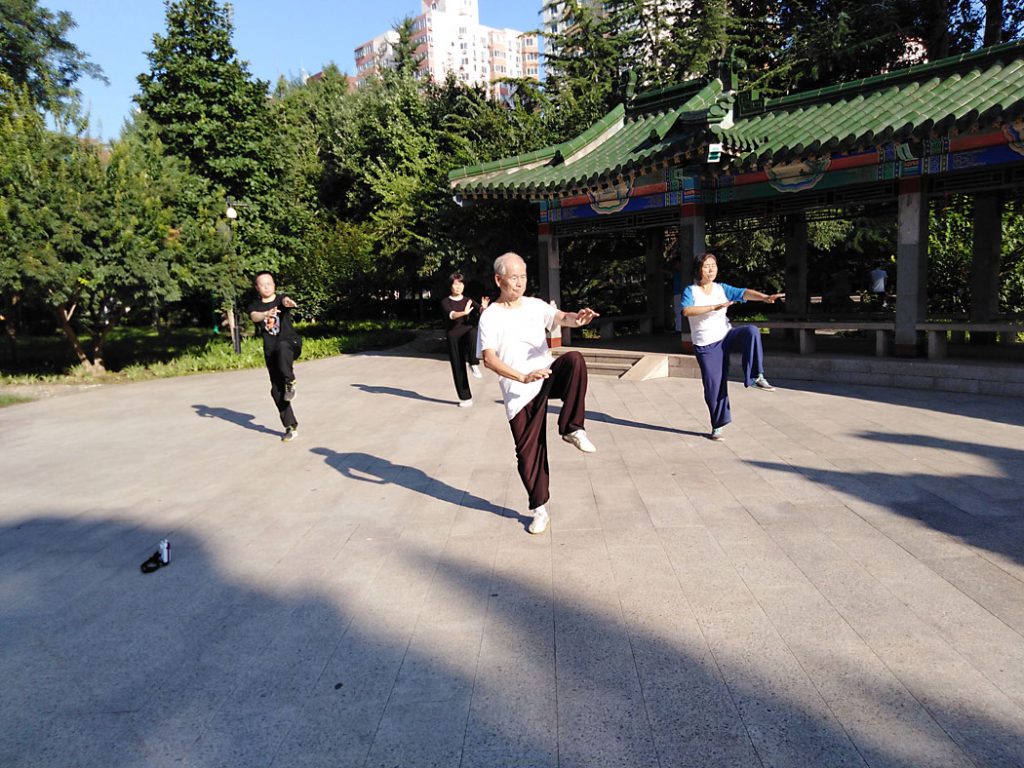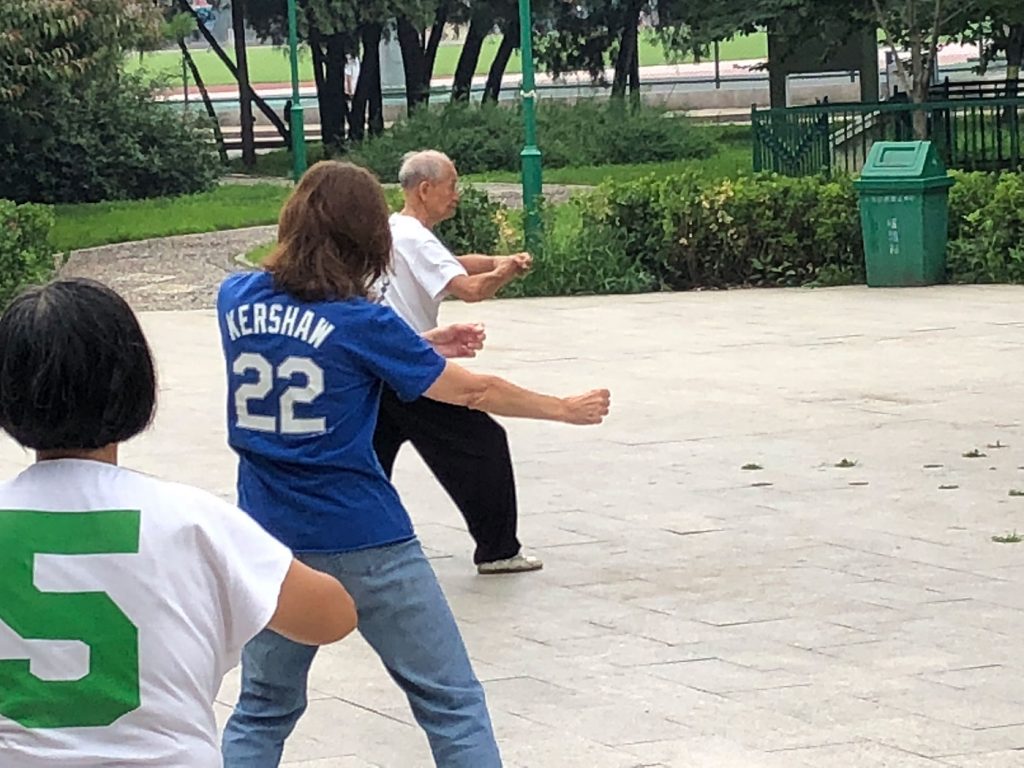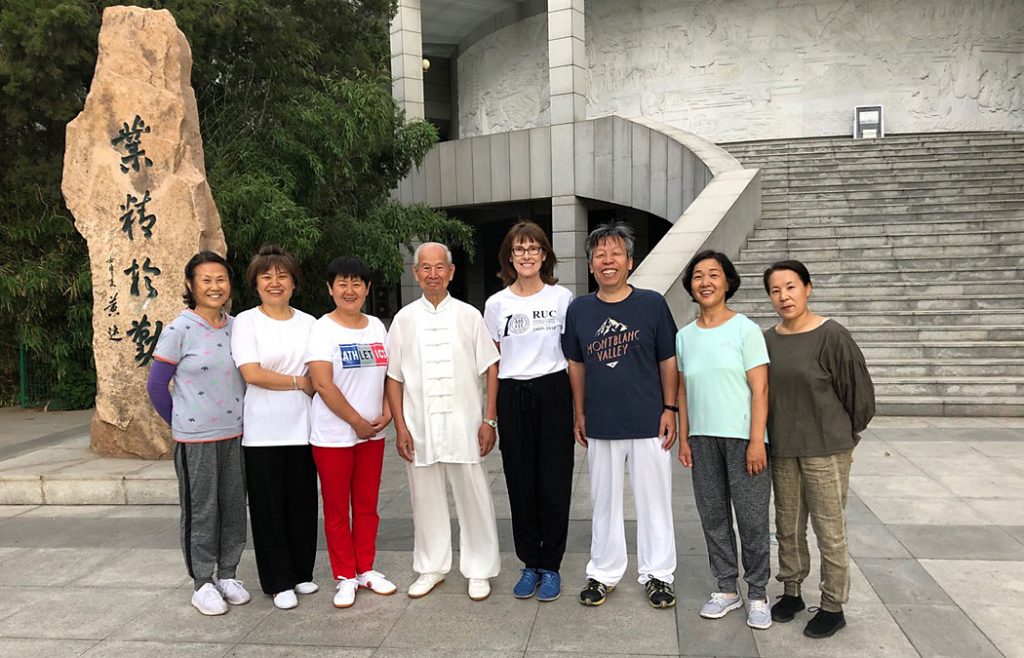
I thought it would be easy to write about my tai chi friends in Beijing. I would start by describing Master Lu, a man of slight build and small stature—not quite as tall as my five-feet-seven-inches. I would show him standing under the trees in the Park of Family Names on the Renmin University campus, where a Chinese-speaking colleague introduced me to him in July 2014.
I’d want you to see him in his tai chi whites—the long tunic and flowing trousers—although he often wears ordinary black pants and a white t-shirt. He stands straight and graceful as a sapling—not straight like a soldier with chin up and shoulders back, no. Master Lu’s shoulders are rounded, his arms loose at his sides, his spine like a string of pearls hanging down. His feet grab the earth. He is ready to lead us through the sequence of 24 positions that comprise the Hunyuan tai chi form.
Or maybe I would backtrack a little so you could see him riding onto campus on his bike, a pink “Beste,” the crossbar says, with red and purple trim, a metal basket on the handlebars. He parks it nearby (under the concrete stairway on the museum plaza if it looks like rain), hops off, tosses his baseball cap in the basket, and takes out his mp3 player (music to accompany the form and, more recently, a recording of himself counting off the exercises). Then he begins his tai chi exercise routine. Anyone who wants to join him is welcome.

I’m beginning to see why it’s not so easy to write this story: six years of tai chi in Beijing to cover, many decisions to make. I haven’t even told you that Master Lu is 93 years old. I haven’t mentioned his awards, which include first place for senior males at the Beijing International Martial Arts Festival. He has earned “the fifth rank of Chinese martial arts.” In 2016 he received awards for “Merit Sportsman” and “Tai Chi Longevity.” I learned only this year that Master Lu came to tai chi rather late in life, when he was diagnosed with a stomach ailment that neither hospitals nor medication seemed to help. To see him move like music through the tai chi form, you would think that he’d been doing this for all of his many years, and you wouldn’t guess that they number 93.
Master Lu’s English is about as limited as my Chinese, but in 2016, when he was only 90, he told me, “I older. I deny.” I think he meant that you are only as old—or as young—as you permit yourself to be.
What should I tell you about the people who join Master Lu in the park or on the plaza? On any given morning, we might be two or three or we might be more than a dozen—mostly women, some men, mostly middle-aged, some older, some younger. There are regulars and drop-ins, like the sanitation worker who empties all the trash cans in the Park of Family Names. He sometimes parks his wooden cart and bamboo brooms beside a tree so he can open his arms wide and lift them to the sky when Master Lu says, “Kai!” Open!

The tai chi group is fluid not only from day to day but from year to year, with people you thought had disappeared suddenly showing up again one morning. I’m one of those people, come to think of it, showing up the first week in July and leaving again toward the end of the month, only to return the next summer.
The colleague who introduced me to Master Lu in 2014 had other obligations and didn’t come to Beijing the following summer. I had been doing exercises at home all year, keeping up as much as I could, but if I wanted to return to the group in 2015, I would have to do it on my own.
It seemed impossible. A whole year had passed. Would anyone remember or recognize me? Even if they did, would they wonder what I was doing here without my Chinese-speaking friend? I wouldn’t be able to explain myself. My smartphone didn’t work in China, and although I’d been studying the language, the truth is I don’t speak Chinese. None of last year’s regulars spoke English either, except for one young man who only came once in a while. In 2015, all I could reliably say was “Hello!” “Thank you!” “I don’t understand,” and “Good-bye!” (I was still working on “Where’s the restroom?”)
Now, five years later, I know how many warm and friendly people I never would have met if I hadn’t gone back to the park, people like Sun Ruxin and Chen Jingfen, Yu Guangyu, Li Baozhen, and Liang Hua, to name a few. I never would have learned their names! They never could have sent me a video of Master Lu doing the form in the park, accompanied by traditional Chinese music, the chatter of voices, and the shriek of Beijing cicadas.
It’s a good thing I got brave on my second jet-lagged morning in Beijing in 2015. I left the chill of the campus hotel to be walloped by a solid heat index of 83 degrees. It was shortly after 6:00 a.m., and I was on my way to the Park of Family Names.
When I reached the lagoon at the edge of the park, I could already see them through the trees, beyond the plaza. There was Master Lu’s white t-shirt. The others faced him in a rough circle, I couldn’t tell who or how many from here.
Closer to me, completely absorbed in a world of her own, the white-haired woman who does her tai chi solo, in impossibly slow motion, was standing on one foot, her other knee raised high, her arms stretched wide and fists curled in fierce and immobile concentration. She didn’t see me, of course, but the young man who hits trees caught my eye. (He is doing ba chi, I would learn later. His name: Liu You.) He had been in the park every morning last July. He smiled at me, and my heart soared. It really did. I smiled back. “Ni hao!” we both said.
Encouraged, I moved on, staying in the shadow of the long marble pergola that skirts one side of the plaza. When I reached the end of it, I was a few feet from the clearing, almost directly behind Master Lu. In my attempts to be unobtrusive, I had caught the attention of everyone in the group except for Master Lu. Most of them were new to me, their faces neutral, but I was delighted to see among them the woman whose fluffy permed hair and gentle manner had somehow reminded me last July of my own (non-Asian) Aunt Sissie. Across from her was the long-haired younger woman—in her 40s, I’d guessed—whose tai chi moves were especially fluid and graceful. Both women smiled and nodded, causing Master Lu to turn and greet me with an exclamation of surprise and welcome. And just like that, there was room for me in the circle.
There is more to this story: Tai Chi in Beijing, Part II
Mary Helen Stefaniak is the award-winning author of The Cailiffs of Baghdad, Georgia. She teaches fiction writing in the International Summer School at Renmin University in Beijing.
